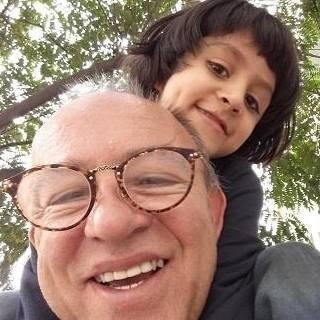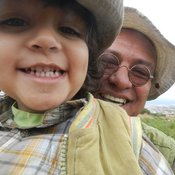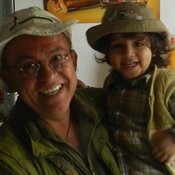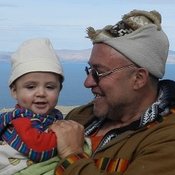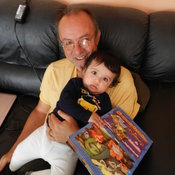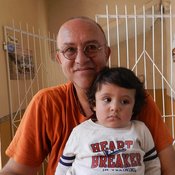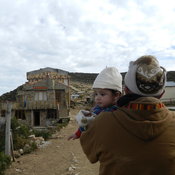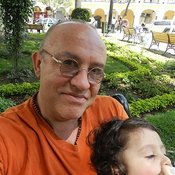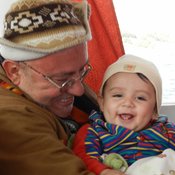 I am a 48-year-old African-American man. As a youth growing up in South Central Los Angeles, I faced many of the typical obstacles poverty, violence, and substance abuse. I joined the US Navy on my nineteenth birthday largely as a way to escape the perils of my environment. What I learned about young people of color in at-risk environments, however, through the experience of being an at-risk child of color myself, is something that I see as a most valuable asset for the social worker who seeks to assist, guide, support, protect, and advocate for children in Foster Care in California—most of them children of color—as I do. I also think this helps to turn my advanced age into an asset, because I feel strongly that older people have much to contribute to the foster care system, especially as a result of the wise and gentle spirit and diplomatic skills that they have had time to cultivate throughout years of service to the community.
I am a 48-year-old African-American man. As a youth growing up in South Central Los Angeles, I faced many of the typical obstacles poverty, violence, and substance abuse. I joined the US Navy on my nineteenth birthday largely as a way to escape the perils of my environment. What I learned about young people of color in at-risk environments, however, through the experience of being an at-risk child of color myself, is something that I see as a most valuable asset for the social worker who seeks to assist, guide, support, protect, and advocate for children in Foster Care in California—most of them children of color—as I do. I also think this helps to turn my advanced age into an asset, because I feel strongly that older people have much to contribute to the foster care system, especially as a result of the wise and gentle spirit and diplomatic skills that they have had time to cultivate throughout years of service to the community.
I became aware of my ability in this regard and have found my new calling as a result of my work with the XXXX County California Child Welfare—especially for my internship, Fall 2012 through Spring 2013—where I effectively interviewed, assessed and counseled families in crisis on the phone and in person. Since I am not a Spanish speaker my focus on African-American families worked out in practice quite well with my Spanish-speaking colleagues attending to most of the Latino cases. Approximately 2/3 of the families with whom we worked were one or the other, either Hispanic or African-American—or at least mixed-race families that involved at least one member of these ethnic minority communities—, highlighting the extremely ethnic character of those whom we were serving, as is often the case in California. I earned my Bachelor of Arts in Social Work at California State University XXXX, in May of 2013; even making the Dean’s List is 2011. I also earned my Group Home Administrator Certificate.
Your world-class program at XXXX is my first choice for graduate school and I assure you that I would attend if accepted. I will attend another program only in case Berkeley is not able to make room for me among many other extremely well qualified applicants. It is not only the prestige of your institution, or its spectacular location so rich with intellectual and social resources, but, most of all, the Center for XXXX Policy and the dream of learning directly from Drs. XXXX and XXXX. The leadership of these pioneers in child welfare policy would be optimal in my case since I seek to focus the balance of my career almost exclusively on the welfare and protection of foster children of color, studying, supporting, defending, and advocating for minority youth in the Child Welfare and Foster Care systems.
I hope to always remain engaged in research in the same areas in which I already have a good start as a result of my research as an undergraduate student: “The Overrepresentation of African Americans in Foster Care,” and “The American Indian’s Experience in Foster Care.” Co-facilitating a classroom presentation of some of the more salient aspect of the historical trauma encountered by American Indians was a special moment in my undergraduate education.
While my grasp of these areas is still rudimentary, this is what most fascinates me and commands my attention; and I feel strongly that my dedication to these subjects, combined with my determination and experience, will help me to excel. I also look forward to in-depth study concerning the unique or singular complexities of Latino as well as Asian children in foster care, constantly improving my own understanding of our own African-American experience through in-depth examinations of the experiences of members of other ethnic groups, particularly native Americans.
Since August of 2011 my service as a Volunteer Advocate for the XXXXSolano County CASA has been the center of my world, advocating for the interests of foster youth, meeting with them every week for several hours, attending court sessions and filing reports to the court concerning the needs of the children. Furthermore, the nearly one year that I spent with XXXX County Child Welfare for my internship taught me what I love most in life, what interests me, how I might go about spending the balance of my professional career improving the lives of some of the most vulnerable members of our community. I adore children and doing everything that I can to safeguard their wellbeing is for me the best road to happiness and fulfillment on personal as well as professional levels. I was never happier than when I was last year, interviewing, assessing, and counseling families, providing comprehensive case management services and completing all documentation with diligence and pride, effectively communicate the agency’s goals and caseworker responsibilities to my clients and developing client-specific case plans, verifying compliance, and monitoring outcomes. Co-facilitating permanency team meetings was a special highlight. In my humble opinion, the best thing about being black in the USA is our opportunity to participate in and contribute to our society’s celebration of diversity; and I very much enjoyed the wide range of ethnic and religious backgrounds that I came into contact with not only with respect to clients but also other human service professionals.
As a Court Appointed Special Advocate (CASA), my task is to research every aspect of the child’s life, using information from the Court, Health and Human Service Agency, school, medical, therapist, and other agencies, I develop a detailed report to be submitted to the judge. If a child’s needs are not being met, I advocate for the best potential outcome. For example, while reading a recent medical report, I noticed that the psychiatrist ordered an increase in the child’s ADHD medication because the child had been lashing out at teachers and peers after lunch for the past three weeks. However, during our scheduled weekly visit, the child discloses that he hasn’t been eating lunch because he wanted to lose weight so that he could make the wrestling team. One of the side-effects of ADHD medications is that it can cause lethargy and irritability in the absence of sufficient food in the stomach. I advocated for an emergency medication evaluation and explained that the child has been skipping lunch, helping to explain the negative behavior. His doctor explained to him the importance of eating lunch before taking his medication and convinced him to eat more protein and exercise to lose weight in a healthy manner. The dosage was reduced, his behavior stabilized, and he made the team.
It would be a bit of a stretch for me to suggest that my experience of 18 years as a mail carrier for the US Postal Service also prepared me well for a career in social work. Nevertheless, the extent to which I will excel as a graduate student will be inspired in part by the profound way in which I had the opportunity to get to know and to share in caring for a local California community for an extended period of time. Serving XXXX was an honor and a privilege: signing a child’s life book; brief conversations with the retired and disabled, in particular, had a long lasting effect. A middle-aged woman who suffered from mental health challenges living alone with her elderly mother haunts me upon occasion until today. I still see her standing in the window looking for me. Shortly after her mother’s death and unable to cope with the loss, she began presenting psychotic behaviors, so neighbors began calling the police. Consequently, the woman was arrested and admitted into a long-term mental health institution. That was only one of the many occasions in which I wished that I were a social worker rather than a mail carrier.
My current professional capacity as a Facility Manager and care giver at a level-11 group home for teen boys –XXXX in Fairfield, CA 6/13-Present—has provided me with an up-close look and in-depth exposure to two critical aspects of our social services that I think we all agree have room for improvement, foster care and mental health systems. My approach to working with clients is to not focus exclusively on their behaviors, also their needs that are not being met. I began working with a young man who was diagnosed with bipolar, mood, and encopresis disorders, for example. I was one of the staff who was able to build a strong rapport with him and became particularly successful at de-escalating his incidents. Six-months after I began working in the group home I was promoted to facility manager and this enabled me to modify his program by altering his consequences, so that we could retain him in the program and work with him at least until he had made further progress. One evening, following an episode of encopresis that he adamantly denied, I received a phone call stating he was placed in a manual restraint because he had attempted suicide by asphyxiation. After I arrived, he calmed down and we talked about what was going on; the following day he and his therapist worked out a plan whereby if he began to feel like he wanted to hurt himself he promised to have me paged. His episodes of encopresis became much less frequent and his progress is exponential.
One of only two undergraduate students from the entire class of 2013 to be assigned for field placement with Child Welfare Services (CWS) was very inspiring since these positions are typically reserved for graduate students. This internship provided me with a unique opportunity to see what it takes to become a CWS social worker and I feel strongly that I have what it takes and will be highly successful at continuing to grow, rapidly accumulating clinical hours, and also becoming an LCSW. I thank you for considering my application to your program.

